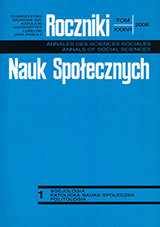Kohabitacja jako alternatywna forma życia rodzinnego
Cohabitation as an Alternative Way of Life
Author(s): Dorota GizickaSubject(s): Social Sciences
Published by: Towarzystwo Naukowe KUL & Katolicki Uniwersytet Lubelski Jana Pawła II
Keywords: cohabitation; family; marriage; informal bonds; youth; kohabitacja; rodzina; małżeństwo; związki nieformalne; młodzież
Summary/Abstract: Getting married and the family have been at the top of Poles’ hierarchy of values in their lives for many years; this concerns both young people and grown-ups. However, it cannot be overlooked that marriage and family undergo numerous changes in the modern world. One of the elements of these changes is popularizing alternative forms of family life. Social perception of informal bonds as a common phenomenon occurring in social life has been changing; so has perception of people involved in such bonds. There are many different alternative lifestyles and they are hard to define. Still, researchers agree that cohabitation is one of the alternative forms of family life. Many researchers studying society ask the questions: ‘What is the place of cohabitation in the Polish society, and how will this form of life function in the future? Is it a threat to the formal marriage and can it take its place in the future?’ Attempting to answer this question on the basis of young people’s opinions seems justified. Young people, although they mostly express negative opinions about cohabitation, do not exclude it in their own lives. Most often they plan pre-marital cohabitation that will precede contracting a formal marriage; it is supposed to be a ‘test’ for the future spouses.
Journal: Roczniki Nauk Społecznych
- Issue Year: 36/2008
- Issue No: 1
- Page Range: 197-216
- Page Count: 20
- Language: Polish

